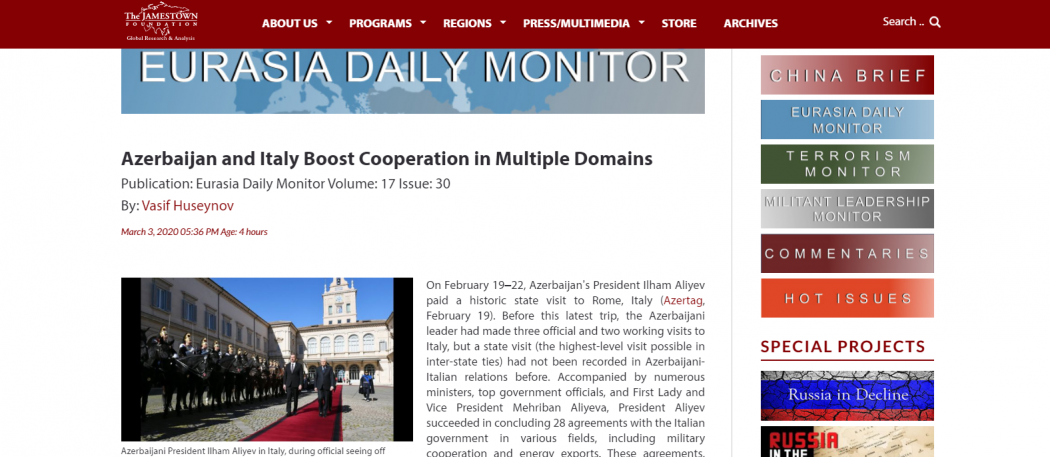On February 19–22, Azerbaijan’s President Ilham Aliyev paid a historic state visit to Rome, Italy (Azertag, February 19). Before this latest trip, the Azerbaijani leader had made three official and two working visits to Italy, but a state visit (the highest-level visit possible in inter-state ties) had not been recorded in Azerbaijani-Italian relations before. Accompanied by numerous ministers, top government officials, and First Lady and Vice President Mehriban Aliyeva, President Aliyev succeeded in concluding 28 agreements with the Italian government in various fields, including military cooperation and energy exports. These agreements, particularly a decision on cooperation in the military industry and the “Joint Declaration on Strengthening Strategic Partnership,” are seen in Baku as greatly important for Azerbaijani foreign policy.
Italy has been one of Azerbaijan’s top partners in the European Union since the beginning of the South Caucasus country’s post-Soviet independence. As a member of the Organization for Security and Cooperation in Europe’s Minsk Group (OSCE MG), the international institution that coordinates the resolution of the Armenian-Azerbaijani conflict over Karabakh, Italy has always been supportive of Azerbaijan’s territorial integrity and sovereignty. Azerbaijani leaders, notably, appreciate the efforts of Italian diplomat Mario Rafaelli, who was the first chairperson of the MG. Rafaelli played a critical role in the adoption of the 1993 United Nations Security Council resolution demanding the withdrawal of Armenian military forces from the occupied Azerbaijani territories in the aftermath of their incursion into Aghdam, a small town in southwestern Azerbaijan (Azertag, February 24).
Trade turnover between the two countries amounted to $6 billion in 2019, which makes Italy Azerbaijan’s top trade partner in Europe (Turan, February 22). This bilateral trade accounts for 92 percent of Italy’s overall trade with the South Caucasus region. Additionally, 17 percent of Italy’s annual oil consumption is supplied by Azerbaijan. In recent years, energy sector cooperation between the two states has been further reinforced by the construction of the Southern Gas Corridor (SGC), which, starting in late 2020, will annually deliver 10 billion cubic meters (bcm) of Azerbaijani natural gas to the European market for the first time in history. At the sixth ministerial meeting of the SGC Advisory Council, held in Baku on February 28, 2020, Azerbaijani Energy Minister Parviz Shahbazov declared that “the last, fourth component of the Southern Gas Corridor has been completed by 92 percent” and should be fully ready before the end of this year (Azernews, February 29). He added that the current capacity of the SGC (16 bcm) can be expanded to 31 bcm and even twice as much in the future—which would even further increase its importance to European energy security, if everything proceeds as originally planned (see EDM, February 10).
The Azerbaijani president’s latest visit to Rome was made possible thanks to the above-described comprehensive political and economic ties; but Aliyev targeted even higher levels of cooperation. This was reflected inter alia in both sides’ willingness to pursue deeper military cooperation. In the course of the visit, Zakir Hasanov, the minister of defense of Azerbaijan, and Alessandro Profumo, the chief executive officer of Italian aeronautics manufacturer Leonardo S.p.A, signed an agreement on the acquisition of M-346 Master trainers/light-attack aircraft (Azeridefence.com, February 20). Reportedly, according to the agreement, Azerbaijan will buy 10–25 of these small jets from the Italian company.
Media sources in Azerbaijan state that the cooperation between Azerbaijan’s Ministry of Defense and Leonardo S.p.A will also include ground-based training aids. The M-346s, which are set to replace Czech-made L-29 Delfin and L-39 Albatros aircraft in the Azerbaijani military, will allow Baku to instruct fifth-generation multi-role fighter pilots (Ainonline, February 27). Azerbaijan notably decided in favor of the Italian product over Russia’s Yak-130, which turned out to be more expensive and faced supply-line-related manufacturing delays due to the ongoing conflict between Moscow and Kyiv (Ainonline, February 27).
The political agreements between Rome and Baku signed during the visit are of no lesser significance for Azerbaijan. Tellingly, the Azerbaijani government has presented the Joint Declaration on Strengthening Strategic Partnership, signed by President Aliyev and Italian Prime Minister Giuseppe Conte, as the first document of its kind that Baku had ever signed with a member of the EU and G7 (Azertag, February 24). In the agreement, the two countries recognized each other as strategic partners and jointly declared an interest in the further development of this partnership. Important for Baku, Rome recognized Armenia as party to the Karabakh conflict and declared its support for the resolution of the conflict while preserving the territorial integrity of Azerbaijan, in line with the Helsinki Final Act and the various resolutions put forth by the UN and the OSCE (AZTV, February 24).
While in Rome, Aliyev also attended the Azerbaijan-Italy economic forum. The last event in this series had been held in Baku, during the official visit of Italian President Sergio Mattarella to the Azerbaijani capital in 2018. Aliyev, praising the economic accomplishments and reforms Azerbaijan made over the last several years, invited Italian companies to his country to invest in various fields, including agriculture, tourism and energy. His government has also opened a new Azerbaijani Cultural Center in Rome, seeking to strengthen people-to-people bonds with Italy and hoping to also benefit from this multifaceted relationship in other platforms as well as within the framework of international organizations. Similarly ready to promote their bilateral relations, Rome declared 2020 the Year of Azerbaijani Culture in Italy (President.az, February 21).
https://jamestown.org/program/azerbaijan-and-italy-boost-cooperation-in-multiple-domains/








